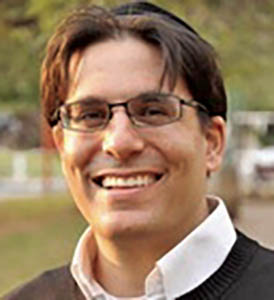

I am afraid. Alarms are ringing, our unit’s door slams shut—all while I am in the middle of leading a learning service at Rikers Island on Rosh Hashanah afternoon. A moment later, I see big officers, with heavy protective wear and clunky helmets, charging down the hallway to the adjacent unit. An officer was just brutally attacked by an inmate.
A night earlier, I am dancing with a group of eight inmates to a Jewish niggun (chant). My heart is nervously pounding, knowing in the back of my mind that a few of these men have already been sentenced for some of the most horrific acts: assault, rape, murder.
This is but a small window into the experience of a High Holidays rabbi at Rikers Island Correctional Center. When I returned home from our 55-member service this Rosh Hashanah, friends on “the outside” asked me, “So, what was it like?” For the first few days, I simply couldn’t answer. I was overwhelmed with emotions and shock.
Now I can answer. It was confusing. Rabbis are trained to answer questions. But how do I answer a precious 17-year-old soul who asks me if God still accepts his repentance even though he keeps repeating the same sin, time after time? How do I respond to an inmate who, during my pre-Mussaf (a central part of the High Holiday liturgy) blessing to the group, yells out, in front of everyone, “Rabbi, your blessings are great. Thank you. But you left out the most important one for all of us: that God will help matir asurim (free the shackled/imprisoned)!” Do I pray that all the attendees not serve any time and be “freed”? Is this a realistic blessing? Is it honest? How should I behave with an inmate who has confessed to and been sentenced for raping, continuously, an innocent young boy—only to be back again between bars for I don’t know what accusation? I come bearing a message of forgiveness and mercy. Does everyone merit God’s mercy?
It was connective. An officer lingers in my room Yom Kippur night after services (I slept over because I do not drive on Jewish holidays). She has just come off a double, 14-hour, shift. Her kids are waiting for her at home and she has only slept two hours the night before. She opened her heart to me. I then realized: She needs us, too. I see an inmate’s face and posture completely change when he is forced to surrender power and autonomy to an officer. I feel how hard it is to walk through, day after day, those gloomy, pain-filled halls. I sense the sadness, despair and self-loathing while giving ear to the countless stories that were shared with me before and after services.
It was exciting. When I first opened up to the inmates, they looked at me skeptically. But the look quickly changed when I talked about God’s love, when we discussed teshuva (repentance) and forgiving ourselves. I’ll never forget the energy of the closed eyes, emotion-infused praying and pumped fists while we belted out, “Forgive us for our iniquities.” This was real. People were literally praying for a new judgment this upcoming year. It was raw, impassioned.
It was inspiring. Alongside all of the emotional charge and fears, I had just gone through one of the deepest, if not the deepest, High Holiday prayers of my life. I came back from Rosh Hashanah wondering how I could ever get back to that level of sincerity in prayer. I know I touched souls. But my soul was touched, too. I was changed.
Before the blessings of the Shema on Rosh Hashanah morning we chant, “A song of ascents, out of the depths I call to you, God” (Psalms 130, 1). The depths are scary. They are dark, disorienting. King David knew all about this. But he also knew what I had just experienced hands-on: Sometimes from these very depths immense blessing can emerge. “Israel, place your hope in God, because with God there is kindness and great saving power. And God will liberate Israel from all of her sins” (Ibid., 7-8).
By Eli Yoggev
Eli Yoggev is a rabbinical student at Yeshivat Chovevei Torah and a Jewish Philosophy PhD candidate at Bar Ilan University.










